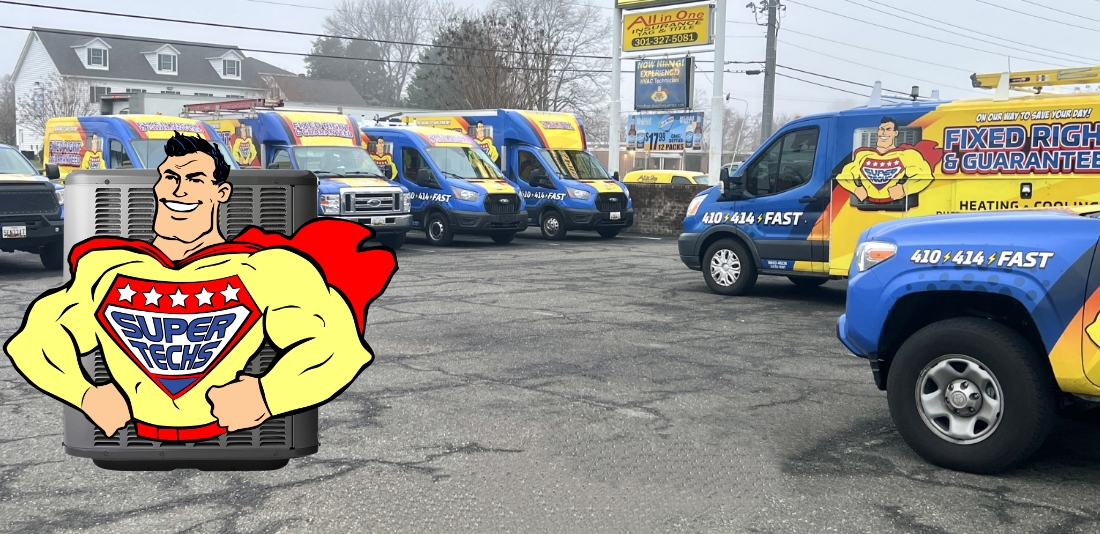
Optimizing Indoor Air Quality for Allergy Management in Maryland
Managing seasonal allergies can be a significant challenge, often exacerbated by indoor air quality in and around Owings, MD. Learn how air purification solutions within your home’s HVAC system can serve as a critical defense against common allergens, thereby enhancing your indoor environment and overall well-being.
As an HVAC and air purification expert, I frequently hear questions about how these systems actually work to clear the air. Fixed Right and Guaranteed Super Techs will break it down in a straightforward way, focusing on what matters most to you and your home.
Maryland’s Allergy Landscape: What’s in the Air?
The state of Maryland comes with its own unique set of airborne challenges. In spring, we contend with tree pollen from oaks and maples; summer brings grass pollen; and fall ushers in ragweed. But it’s not just what’s outside. Inside our homes, we deal with dust mites, pet dander (a big one for animal lovers!), mold spores, and even microscopic cockroach allergens.
When these tiny particles enter our respiratory system, our immune systems can sometimes overreact, triggering those familiar allergy symptoms: sneezing, a runny nose, itchy eyes, congestion, and even coughing or wheezing. It’s certainly not pleasant to experience.
How Does Air Purification Offer Relief?
This is where air purification steps in as your home’s quiet defender. The core idea is simple: these systems are designed to capture and remove airborne allergens and irritants from the air you breathe within your home. Think of it as giving your indoor environment a deep, continuous breath of fresh air.
There are several effective ways air purification systems achieve this. Understanding them can help you decide the best solution for your Maryland home:
Mechanical Filtration (HEPA Filters)
This is often considered the gold standard. HEPA, which stands for High-Efficiency Particulate Air, refers to filters that can capture at least 99.97% of airborne particles as small as 0.3 microns. To put that in perspective, common allergens like pollen, pet dander, and most dust mite allergens are larger than 0.3 microns. As your home’s air circulates through these filters, these microscopic nuisances get trapped, and cleaner air is sent back into your living spaces. Many modern HVAC systems can be upgraded with high-MERV (Minimum Efficiency Reporting Value) filters, offering excellent filtration similar to standalone HEPA units. For Marylanders, especially during peak allergy seasons, upgrading your HVAC filter to a MERV 11 or higher can make a noticeable difference.
Activated Carbon Filters
While HEPA filters excel at trapping particles, they don’t tackle odors or volatile organic compounds (VOCs)—those invisible gases released from cleaning products, paints, and even new furniture. Activated carbon filters solve this. Their porous structure absorbs and neutralizes odors and VOCs. If you’re sensitive to chemical smells or just want fresher air, an activated carbon filter is a valuable addition.
UV-C Light Purifiers
This technology uses ultraviolet-C light to target living microorganisms like mold spores, bacteria, and viruses. When these airborne pathogens pass through the UV-C light, their DNA is damaged, rendering them inactive and unable to reproduce. For Maryland homes that might contend with humidity-driven mold issues, or for those seeking an extra layer of defense against airborne germs, a UV-C purifier integrated into your HVAC system can be a smart investment.
Ionizers/Electrostatic Precipitators
These systems work by electrically charging airborne particles, causing them to clump together or stick to charged plates or other surfaces. They can be effective at particle removal, but it’s important to note that some older ionizers can produce ozone, which is a lung irritant. Reputable, modern systems are designed to produce minimal to no ozone. Always discuss this with your HVAC professional.
Common Questions from Maryland Homeowners:
You likely have a few questions swirling, so let’s address some common inquiries I receive:
Should I get a whole-home air purifier or just a portable one?
Portable units are great for specific rooms, like your bedroom, offering targeted relief. However, for a comprehensive solution that cleans the air throughout your entire house, a whole-home air purification system integrated with your HVAC is generally the most effective. It cleans the air as it circulates through your ductwork, benefiting every room.
How often do I need to change my filters?
This depends on the filter type and your home’s environment. For standard HVAC filters, I recommend checking them monthly and changing them every 1 to 3 months, especially during allergy season or if you have pets. High-efficiency or specialized air purifier filters might have different schedules, so always refer to the manufacturer’s guidelines. A clogged filter is like trying to breathe through a blocked straw—it simply won’t work well!
Can air purification completely eliminate my allergy symptoms?
While air purification can significantly reduce airborne allergens and greatly alleviate symptoms for many, it’s not a magic bullet. It works best as part of a broader strategy that may include regular cleaning, dust mite covers for bedding, and, if necessary, guidance from an allergist. However, for countless Maryland allergy sufferers, cleaner indoor air can dramatically improve daily comfort. Research has shown that HEPA air purifiers can reduce the concentration of pollen, dust mites, and dog dander, although some studies have had mixed results, particularly with animal dander and dust mites that settle on surfaces rather than remaining airborne.
Is it expensive to operate these systems?
Operating costs vary. Filters need regular replacement, and the systems use a small amount of electricity. However, many homeowners find the improved comfort and health benefits far outweigh these costs. Consider it an investment in your family’s well-being.
Taking Control of Your Home’s Air
Living with allergies in Maryland doesn’t have to mean constant discomfort. By understanding how air purification works and choosing the right system for your home, you can significantly reduce your exposure to common allergens and enjoy cleaner, healthier indoor air. Improving your indoor air quality is crucial, especially since we spend so much time indoors.
If you’re a Maryland homeowner grappling with allergies and wondering how a humidifier or dehumidifier is the best solution for your specific needs, don’t hesitate to call the pros at Fixed Right and Guaranteed Super Tech at 410-414-3278 and one of our trusted HVAC professionals will help.
We can assess your home, discuss your unique challenges, and recommend the most effective strategies to help you and your family breathe easier. If you have any additional questions, please contact us online.








